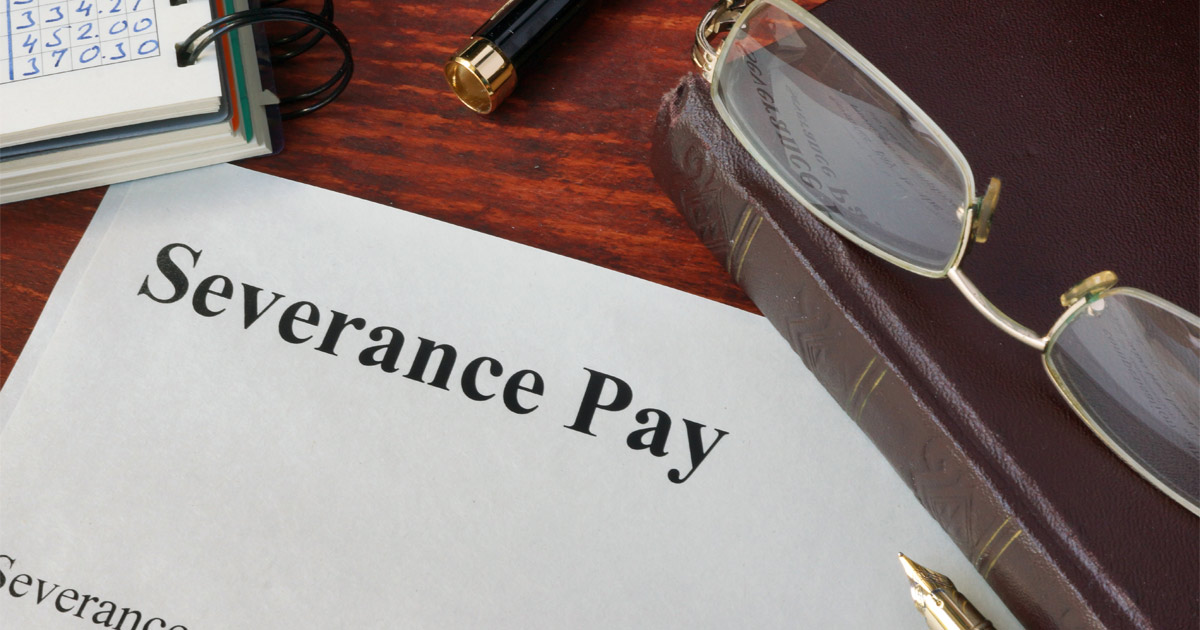Do Employers Have to Provide Severance Pay?
June 16, 2022
Severance pay is pay or benefits paid to an employee after being fired, laid off, or discharged. In most cases, employers do not have to pay an employee severance pay when they have been fired or discharged. New Jersey does not require employers to provide severance pay to employees, however, there are a few exceptions.
Employers may be required to provide severance pay if they have a written policy. The policy must be included in an employee handbook or another written document that is given to employees.
Employers may be required to provide severance pay if they have a collective bargaining agreement with a labor union. The agreement must include a provision requiring severance pay.
Severance pay may be required if there is a contract between the employee and the employer. In many situations, the contract will require severance pay under specific scenarios. For example, the contact may prohibit severance pay if the employee was terminated “for cause” or specifically outlined reasons. Also, the employment contract may provide a formula to determine the amount of severance pay.
There is a rare example of when severance is required under federal law. Under the Worker Adjustment and Retraining Notification (WARN) Act, if the employer has more than 100 workers and is about to lay off employees, the employer must provide each employee with at least 60 days’ notice. Failure to do so will require severance pay.
With a few exceptions, severance pay is required if it is put in writing. If severance pay is given outside of one of these scenarios, then it is done by the employer’s decision.
Determining the Amount of Severance Pay
Sometimes, a specific amount or formula is used to determine the amount of severance pay. For example, in some cases, the contract or written policy may say “two weeks of severance pay.” If an employer is required to provide severance pay, they must generally pay the employee their regular salary. The amount and duration of the payment will depend on the circumstances.
The employer may be able to decide the amount as long as it meets the amount that is outlined in the written policy or contract.
Why Is Severance Pay Offered?
Even though an employer may not be required to offer severance pay, there are valid reasons to do so. Severance pay is a sign of goodwill, demonstrating to workers that their employer values them as employees. It is also possible that your employer plans to reduce or eliminate some of your benefits, making you eligible for severance pay.
Should a Release Be Signed Before Receiving Severance Pay?
Although it is not required to have an employee sign a release before issuing a severance payment, it is recommended. Releases can be complex, and an employee should have the release reviewed by a lawyer. The release must meet legal requirements, and a lawyer can also determine if the release is fair.
In exchange for severance pay, an employer may insist that the employee sign a release stating that the employer is free of future potential litigation. There is no need for an employee to sign a release if no severance pay is available. The employee’s last paycheck cannot be used as a consideration for signing the release.
Employees who are 40 years old or older are covered by the Older Workers Benefit Protection Act (OWBPA). Any terminated employee over 40 years old given a severance agreement has 21 days to decide whether to sign and accept the severance pay. Once signed, the employee has an additional seven days during which they can back out. During this period, the employee should have a lawyer review the severance agreement.
What About Accrued Sick Time and Vacation Time?
You may have questions about whether an employer can withhold accrued sick time or vacation time. Also, you may wonder about whether an employer can pay these, say it is severance pay, and require you to sign a release. You should note that employers cannot do these things.
Accrued “vested” vacation time must be paid. Even if the employee is fired for cause, they must get their last paycheck up to the day they were fired. Employers are not required to pay back accrued sick time unless there is a written policy for it, it is included in an employment contract, or it is provided for in a union agreement. It is important to note that New Jersey is one of 37 states that does not require an employer to pay back a terminated employee’s unused vacation time. All of these concerns can be addressed with a lawyer.
Cherry Hill Employment Lawyers at Sidney L. Gold & Associates, P.C. Help Employees Get Fair Severance Pay
Not getting the pay you deserve can be difficult, especially if you are owed severance pay when you need it the most. If you are having trouble with your severance pay, speak with one of our experienced Cherry Hill employment lawyers at Sidney L. Gold & Associates, P.C. We help employees with employment issues, including severance pay. We will thoroughly examine the facts of your case, ensure that your legal rights are upheld, and assist you through every step of the process. Call us at 215-569-1999 or contact us online for a free consultation. Located in Philadelphia and Pennsauken, New Jersey, we serve clients across South Jersey, including Cherry Hill, Haddonfield, Marlton, Moorestown, and Mount Laurel.





























